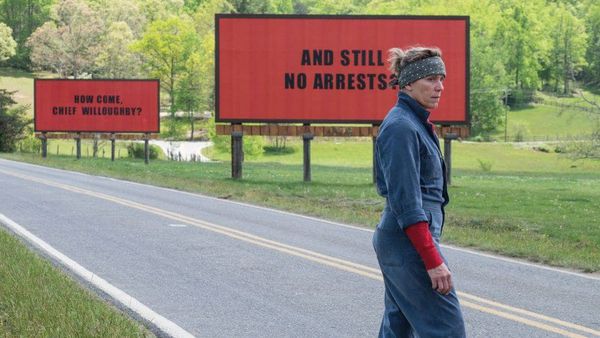Eye For Film >> Movies >> Three Billboards Outside Ebbing, Missouri (2017) Film Review
Three Billboards Outside Ebbing, Missouri
Reviewed by: Amber Wilkinson

The success of Three Billboards Outside Ebbing, Missouri is due in no small part to three performances - that of Frances McDormand, Woody Harrelson and Sam Rockwell. It's perhaps fitting that they should form a trinity, given that the film features biblical themes such as redemption and, if not divine retribution then certainly the sort that is "treasured up" or delayed - themes that make his movie feel like a kindred spirit of his brother John Michael McDonagh's Calvary.
McDormand plays Mildred, who in order to stop herself drowning in grief after the brutal murder of her daughter, decides to fight back when the case remains unsolved, purchasing the titular billboards and plastering them with details of the crime and the question: "How come Chief Willoughby?".

Sorrow gives her steel in the face of the small town community where her police chief (Harrelson) is not only well liked - and dedicated to finding the perpetrator - but also suffering from cancer. Rockwell, meanwhile, plays one of the town's other cops, Officer Jason Dickson, a man who takes racism to the level of an Olympic sport.
McDonagh lets the guilt flow freely and in unexpected places, not so much tearing our sympathies as folding them in on themselves until we realise that simple answers are unlikely in the presence of complex humans. His moral questioning extends well beyond whether people such as racists or wife beaters (John Hawkes in a role that allows him to run the full range from charm to harm) are irredeemable, to consider how easily blood lust might come to anyone in the right - or wrong - circumstances. Only once do his theatre roots really show, in a moment when Mildred encounters a poorly realised CGI deer, a situation sparking a rumination that, were it not for McDormand, would break the spell of the more naturalistic feel of the rest of the film.
Fortunately, McDormand never lets Mildred's hold on us slip, balancing the conundrum of a woman who is simultaneously a mum, who likes a beer and a game of pool, and a Rambo-style avenging angel, with polka-dot bandanna and an explosive anger. Her blistering delivery is so good that she even received cheers mid-movie after one particularly rousing dressing down of a priest during the film's screening at San Sebastian. We see Mildred's mordant humour licking up like flames around her own sense of guilt and, even as we warm to her, when she says, "This time, the chick ain't losing", there's the flicker of madness to her actions. Her borderline craziness is brought into focus by the understanding of Willoughby, with Harrelson - who just keeps getting better with age - playing him with a very different sense of grief thanks to the knowledge of his own approaching demise.
The ability to balance extreme violence, emotional substance to chew on and black comedy has been evident in McDonagh's work since In Bruges. There, he struggled to completely marry them together, but here he finds a way to keep things on track. No moment, it seems, is too horrific for humour, a stance that particularly suits Rockwell's ability to shift from comedy to danger and on to tragedy in the space of a few lines of dialogue.
McDonagh isn't interested in easy and his story doesn't move in ways you expect, as our sympathies and loyalties shift uncomfortably, we come to realise that what we might do in a given circumstance may be dictated not by a long stewing anger but by the precise moment of choice. In the end, its not our judgement that counts, it's our compassion.
Reviewed on: 13 Oct 2017















